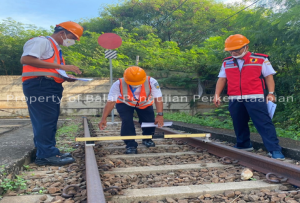Track Inspector (PPJ), Vital Profession for Rail Travel Safety

BEKASI (15/07) – When you are about to take the train, you will meet an officer who will check your ticket and identity card at the station. Or if there are problems related to travel, you can meet the customer service officer at the station. Likewise, during the travel, you will meet the conductor and special train police who will accompany and provide assistance if there are difficulties.
In addition to the professions mentioned above, there are other professions whose roles are vital and essential in maintaining and realizing the safety of train travel. An important profession that has become one of the frontlines is the Track Inspectior (PPJ). A PPJ is in charge of inspecting the railway line to ensure that the track to be passed by the train is in a safe condition.
In their routines, PPJ performs its duties by walking on the train line (rail) from a predetermined station or point to another station or point in its working area. He visually checked by bringing work equipment, red and yellow flags, and hand-sign lights to protect the train journey.
A PPJ examines the condition of the train track he is passing in detail, such as tightening the rail bolts and checking whether the rail condition is in good condition so that it is safe for the train to pass. Discipline and thoroughness are the primary keys for a PPJ in carrying out their duties.
In addition to supporting the safety of the train, PPJ is also required to maintain their safety while working by obeying/disciplining the established Standard Operating Procedure (SOP).
Accuracy is also highlyneeded because PPJ must understand the procedures for checking railway lines. He must be able to analyze and evaluate the results of inspections that potentially endanger the train journey and determine the required speed limiter. PPJ must also know the official regulations related to their field of work.
In the Regulation of the Minister of Transportation Number PM 9 of 2017 concerning Certification of Railway Infrastructure Inspectors must meet competency standards consisting of:
- Know and understand the procedures for inspecting railway infrastructure;
- Know and understand the technical specifications of railway infrastructure;
- Able to carry out inspections of systems and components of railway infrastructure;
- Able to repair in accordance with the requirements and standards of inspection of railway infrastructure;
- Able to plan implementing activities of the inspection of railway infrastructure;
- Able to analyze and evaluate inspection results according to the requirements and standards of inspection of railway infrastructure;
- Able to assess the results of the inspection of railway infrastructure;
- Able to provide recommendations for the railway infrastructure improvements.
To find out whether a Track Inspector (PPJ) already has and meets the competency standards mentioned above, this is where the role of the Railway Testing Center, especially the Railway HR Examiner Team, is to conduct a Competency Test on test participants assigned as Track Inspector (PPJ).
The Competency Tests that participants must pass are as follows:
- Theory Test;
- Practice Test;
- Interview; and
- Medical check-up.
If one of the series of Competency Test stages gets a score below the predetermined standard, participants must repeat the Competency Test..
If the participant has completed all stages of the Competency Test, the Railway HR Testing Team of the Railway Testing Center will be forwarded to the Directorate of Safety to consider whether the Competency Test participants get a certificate or not regarding to theexpertise and identification according to their field.
PR - Railway Testing Center



_(2).png)
_(3).png)
_(740_×_322_piksel).png)
_(2).png)
Komentar
LOGIN FOR COMMENT Sign in with Google